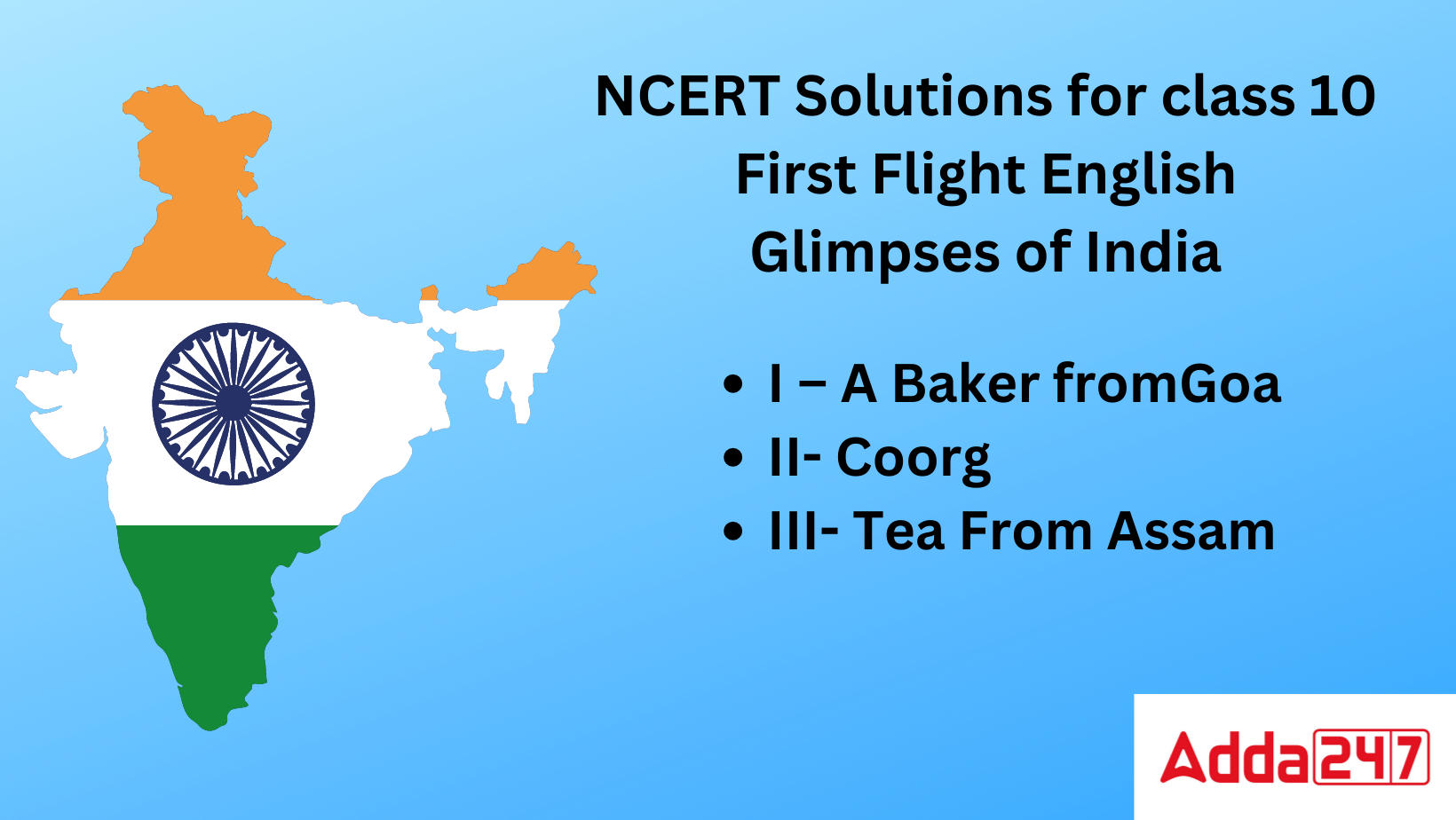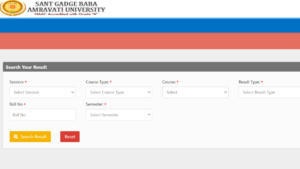NCERT Solutions Class 10 English Chapter 7 Glimpses of India
The summary of Glimpses of India includes three short stories. Goan baker Lucio Rodrigues is the author of the opening tale. The second tale is about Coorg, a city in Karnataka, and was written by Lokesh Abrol. The author describes the Coorg ecosystem, wildlife, weather, people, and terrain in this story. Tea from Assam, written by Arup Kumar Datta, is the final tale. In the third tale, two pals acknowledge the legends after finding Assam’s tea gardens.
I – A Baker from Goa
A baker from Goa is a historical account that takes place during the Portuguese occupation of Goa. The significance of a baker in the Goa village is the main focus of the narrative. The author discussed how, even though the Portuguese have departed the country, the value of bakers is still retained. When they come to sell loaves of bread on the streets, paders, who make a jingling sound with bamboo, are referred to by bakeries. The author and his buddies would wake up to the same jingling sound when they were little. Without even cleaning their lips, they were expected to sprint in his direction. The housemaid servant purchased the loaves of bread that the kids ate.
In Goa, the narrator recalls, bread was an essential component of every celebration, particularly the sweet bread known as Bol. The tale of the Goan baker demonstrates the significance of this delicious bread in marriages. In former times, the lady would make sandwiches in honour of her daughter’s engagement. During that time, loaves of bread were used to make cakes, sandwiches, and other things. Additionally, bakers wore “Kabai,” a remarkable knee-length dress. The bakery has been a lucrative career since that point.
II- Coorg
The Coorg or Kodagu district of Karnataka is the subject of the tale Coorg. Coorg is referred to by the author as a wonderful location situated halfway between Mangalore and Mysore. With its evergreen forests, spice fields, and coffee plantations, it is without a doubt God’s home. From September through March, the weather is good, attracting a lot of visitors. Here, the air is thick with the smell of coffee. Wearing a long, black cloak like the kuffia worn by Arabs, Coorg people are sometimes seen donning Kuppia.
People from Coorg are renowned for their bravery. The Coorg Regiment is one of the most significant regiments in the Indian Army. Our first army commander, General Cariappa, is also a Coorg native. The Cauvery River receives a lot of its water from the hills and forests of Coorg. Bylakuppe, a Buddhist monastery, is located on Nisargadhama Island close to Coorg.
III- Tea From Assam
Rajvir and Pranjol, two buddies, come to Assam at the beginning of the tale of Assam Tea. On their journey, they pause to purchase tea from a roadside vendor. Rajvir informs Pranjol that each day, more than 800,000,000 cups of tea are consumed in the world. Pranjol is reading a detective novel as Rajvir takes in the lovely and peaceful surroundings. As far as the eye could see, tea bushes could be found everywhere. They also noticed a structure that housed a tea garden.
The largest tea plantation is in Assam. A few tea twigs accidentally fell into the scalding hot water, according to folklore. The delicious flavour was enjoyed by the Emperor. This is how it happened. Legend has it that Buddhist monk Bodhidharma amputated his eyelids to prevent dozing off while meditating. At Mariani Junction, they both got off the boat, and they walked over to Dhekiabari Tea Estate. There, they observed women gathering tea leaves. There, Pranjol’s father met them and pretended to be an authority in tea estates. Rajvir says he’d like to pick his brain.
NCERT Solutions for Class 10 English Chapter 7 Glimpses of India: Video Explanation
Watch the given video explanation of the chapter for a better understanding
NCERT Solutions for Class 10 English Chapter 7 Glimpses of India: PDF
A PDF is given below for the students’ accessibility which they can download for future reference
NCERT Solutions for Class 10 English Chapter 7 Glimpses of India
NCERT Solutions for Class 10 English Chapter 7 Glimpses of India: Solved Textbook Questions
I. A Baker from Goa
Oral Comprehension Check (Page 86)
Question 1: What are the elders in Goa nostalgic about?
Answer: The elders in Goa have fond memories of the early Portuguese era and their adoration of the renowned bread loaves. The author also notes that while bread consumers are no longer around, bread manufacturers are still around.
Question 2: Is bread-making still popular in Goa? How do you know?
Answer: Yes, baking bread is still a common activity in Goa. It is clear from the fact that there are still people who manufacture bread even though there are no longer any bread consumers. They can be identified by the fact that there are mixers, moulders, bakers, and furnaces that have stood the test of time.
Question 3: What is the baker called?
Answer: In Goa, a baker is commonly referred to as a pader.
Question 4: When would the baker come everyday? Why did the children run to meet him?
Answer: Every day, the baker would visit twice: once when he left early in the morning and again when he came back after emptying his large basket by selling all of his bread.
The kids would hurry to meet him because they loved to eat bread and wanted properly chosen bread bracelets. Sometimes it was specially made sweet bread.
Oral Comprehension Check (Page 87)
Question 1: Match the following. What is a must
(i) as marriage gifts? – cakes and bolinhas
(ii) for a party or a feast? – sweet bread called bol
(iii) for a daughter’s engagement? – bread
(iv) for Christmas? – sandwiches
Answer:
(i) as marriage gifts? – sweet bread called bol
(ii) for a party or a feast? – bread
(iii) for a daughter’s engagement? – sandwiches
(iv) for Christmas? – cakes and bolinhas
Question 2: What did the bakers wear: (i) in the Portuguese days? (ii) when the author was young?
Answer:
(i) Back in the days of the Portuguese empire, bakers were frequently attired in an odd garment known as the kabai. It was a long, one-piece dress that reached to her knees.
(ii) The author recalls seeing bakers in his youth wearing shirts and pants that were longer than half-pants but shorter than full-length ones.
Question 3: Who invites the comment — “he is dressed like a pader”? Why?
Answer: Anyone sporting a half-pant that falls just below the knees is sure to receive the remark, “He is dressed like a pader.” This is due to the fact that bakers, also known as paders in Goa, used to dress similarly.
Question 4: Where were the monthly accounts of the baker recorded?
Answer: The bakers typically paid their bills at the end of the month, and their monthly accounts were written down in pencil on a wall somewhere in the house.
Question 5: What does a ‘jackfruit-like appearance’ mean?
Answer: A “jackfruit-like look” refers to a bulky frame. A baker formerly had this physique because it was thought that he and his family never went hungry. The baker, his family, and his servants always appeared content and wealthy due to the lucrative nature of their occupation.
Thinking about the Text (Page 88)
Question 1: Which of these statements are correct?
(i) The pader was an important person in the village in old times.
(ii) Paders still exist in Goan villages.
(iii) The paders went away with the Portuguese.
(iv) The paders continue to wear a single-piece long frock.
(v) Bread and cakes were an integral part of Goan life in the old days.
(vi) Traditional bread-baking is still a very profitable business.
(vii) Paders and their families starve in the present times.
Answer:
- Correct
- Correct
- Incorrect. The paders still exist in Goan villages.
- Incorrect. The bakers wear a shirt and trousers that are shorter than full-length ones and longer than half pants.
- Correct
- Correct
- Incorrect. Baking happens to be a profitable business in Goa.
Question 2: Is bread an important part of Goan life? How do you know this?
Answer: Yes, bread plays a significant role in Goan culture. It is frequently used for feasts and gifts at weddings. During their daughters’ engagements, mothers also make sandwiches with bread. Everyone in Goa enjoys the aroma of freshly baked bread, according to the author. The young yearn for bread bracelets while the elderly are served loaves. Therefore, every home has to have bread on hand for all circumstances. In Goa, baking is therefore regarded as a lucrative industry because the population has always loved scrumptious bread.
Question 3: Tick the right answer. What is the tone of the author when he says the following?
(i) The thud and the jingle of the traditional baker’s bamboo can still be heard in some places. (nostalgic, hopeful, sad)
(ii) Maybe the father is not alive but the son still carries on the family profession. (nostalgic, hopeful, sad)
(iii) I still recall the typical fragrance of those loaves. (nostalgic, hopeful, naughty)
(iv) The tiger never brushed his teeth. Hot tea could wash and clean up everything so nicely, after all. (naughty, angry, funny)
(v) Cakes and bolinhas are a must for Christmas as well as other festivals. (sad, hopeful, matter-of-fact)
(vi) The baker and his family never starved. They always looked happy and prosperous. (matter-of-fact, hopeful, sad)
Answer:
(i) nostalgic
(ii) hopeful
(iii) nostalgic
(iv) funny
(v) matter-of-fact
(vi) matter-of-fact
II- Coorg
Thinking about the Text (Page 92-93)
Question 1: Where is Coorg?
Answer: Coorg or Kodagu is the smallest district of Karnataka that is located midway between Mysore and Mangalore.
Question 2: What is the story about the Kodavu people’s descent?
Answer: The fiercely independent people of Coorg are believed to be the descendants of people of Greek or Arabic origin. As the story goes, a section of Alexander’s army moved south along the coast and settled there when they could not return to their country. These people married amongst the locals and their culture is apparent in the martial traditions, marriage and religious rites, which are distinct from the Hindu mainstream. This is the beautiful story about the Kodavu people’s descent.
Question 3: What are some of the things you now know about
(i) the people of Coorg?
(ii) the main crop of Coorg?
(iii) the sports it offers to tourists?
(iv) the animals you are likely to see in Coorg?
(v) its distance from Bangalore, and how to get there?
Answer: (i) The Coorgi or Kodagu people are fiercely independent people comprising martial men and beautiful women who are believed to have descended from the Greeks or the Arabs. They have a strong tradition of hospitality and they are more than willing to recount numerous tales of bravery that are related to the men of this region. As a matter of fact, the Kodavus are the only people in India who are permitted to carry firearms without a licence.
(ii) Coffee is the main crop of Coorg. The air smells of invigorating coffee. Coffee estates and colonial bungalows stand tucked under tree canopies in prime corners of the town.
(iii) Coorg offers a variety of high-energy adventure sports that include river rafting, canoeing, rappelling, rock climbing, mountain biking and trekking.
(iv) The animals that you are likely to see in Coorg include Macaques, Malabar squirrels, langurs, slender lorises, wild elephants, etc. You can also see birds, bees and butterflies giving you company around the corner.
(v) By road, Coorg is around 250 – 260 kilometres from Bangalore and there are two routes to reach there. One route is via Mysore, which is the most frequented one. The other route is via Neelamangal, Kunigal and Chanrayanapatna.
Question 4: Here are six sentences with some words in italics. Find phrases from the text that have the same meaning. (Look in the paragraphs indicated)
(i) During monsoons it rains so heavily that tourists do not visit Coorg. (para 2)
(ii) Some people say that Alexander’s army moved south along the coast and settled there. (para 3)
(iii) The Coorg people are always ready to tell stories of their sons’ and fathers’ valour. (para 4)
(iv) Even people who normally lead an easy and slow life get smitten by the high-energy adventure sports of Coorg. (para 6)
(v) The theory of the Arab origin is supported by the long coat with embroidered waist-belt they wear. (para 3)
(vi) Macaques, Malabar squirrels observe you carefully from the tree canopy. (para 7)
Answer: (i) to keep many visitors away
(ii) As one story goes
(iii) are more than willing to recount
(iv) The most laidback individuals become converts to
(v) draws support from
(vi) keep a watchful eye
III- Tea From Assam
Thinking about the Text (Page 96-97)
Question I:
1. Look at these words: upkeep, downpour, undergo, dropout, walk-in. They are built up from a verb (keep, pour, go, drop, walk) and an adverb or a particle (up, down, under, out, in).
Use these words appropriately in the sentences below. You may consult a dictionary.
(i) A heavy ____________________ has been forecast due to low pressure in the Bay of Bengal.
(ii) Rakesh will __________________________________ major surgery tomorrow morning.
(iii) My brother is responsible for the ____________________________of our family property.
(iv) The ________________________________ rate for this accountancy course is very high.
(v) She went to the Enterprise Company to attend a __________________________ interview.
Answer:
(i) A heavy downpour has been forecast due to low pressure in the Bay of Bengal.
(ii) Rakesh will undergo major surgery tomorrow morning.
(iii) My brother is responsible for the upkeep of our family property.
(iv) The dropout rate for this accountancy course is very high.
(v) She went to the Enterprise Company to attend a walk-in interview.
2. Now fill in the blanks in the sentences given below by combining the verb given in brackets with one of the words from the box as appropriate.
| over | by | through | out | up | down |
(i) The Army attempted unsuccessfully to ______________________ the Government. (throw)
(ii) Scientists are on the brink of a major _____________________ in cancer research. (break)
(iii) The State Government plans to build a ________________ for Bhubaneswar to speed up traffic on the main highway. (pass)
(iv) Gautama’s ________________ on life changed when he realised that the world is full of sorrow. (look)
(v) Rakesh seemed unusually _________________________ after the game. (cast)
Answer:
(i) The Army attempted unsuccessfully to overthrow the Government.
(ii) Scientists are on the brink of a major breakthrough in cancer research.
(iii) The State Government plans to build a bypass for Bhubaneswar to speed up traffic on the main highway. (pass)
(iv) Gautama’s outlook on life changed when he realised that the world is full of sorrow.
(v) Rakesh seemed unusually downcast after the game.
Question II:
Notice how these -ing and -ed adjectives are used.
| (a) Chess is an interesting game. | I am very interested in chess. |
| (b) Going trekking in the Himalayas this summer is an exciting idea. | We are very excited about the trek. |
| (c) Are all your school books this boring? | He was bored as he had no friends there. |
The -ing adjectives show the qualities that chess, trekking, or these books have: they cause interest, excitement, or boredom in you. The —ed/—en adjectives show your mental state, or your physical state: how you feel in response to ideas, events or things.
1. Think of suitable -ing or -ed adjectives to answer the following questions. You may also use words from those given above.
How would you describe
(i) a good detective serial on television? _________________________________________
(ii) a debate on your favourite topic ‘Homework Should Be Banned’? ______________________
(iii) how you feel when you stay indoors due to incessant rain? __________________________
(iv) how you feel when you open a present? _______________________________________
(v) how you feel when you watch your favourite programme on television? __________________
(vi) the look on your mother’s face as you waited in a queue? ____________________________
(vii) how you feel when tracking a tiger in a tiger reserve forest? __________________________
(viii) the story you have recently read, or a film you have seen? ___________________________
Answer:
(i) a good detective serial on television? Interesting
(ii) a debate on your favourite topic ‘Homework Should Be Banned’? Exciting
(iii) how you feel when you stay indoors due to incessant rain? Bored
(iv) how you feel when you open a present? Excited
(v) how you feel when you watch your favourite programme on television? Interested
(vi) the look on your mother’s face as you waited in a queue? Fatigued
(vii) how you feel when tracking a tiger in a tiger reserve forest? Thrilled
(viii) the story you have recently read, or a film you have seen? Interesting
2. Now use the adjectives in the exercise above, as appropriate, to write a paragraph about Coorg.
Answer: Students have to do this by themselves.
|
Found this article helpful? Let’s connect via chat or call our senior expert counselor at +91-9625869989 to learn more about the different streams and options available. We would love it if we could add some of your insights. If you have a definite goal of scoring the highest marks, then you can resolve your doubts via our Adda247 app/quizzes and youtube class assistance (https://www.youtube.com/c/Adda247School) |
NCERT Solutions for Class 10 English Chapter 7 Glimpses of India: FAQs
Que. Where and how to download NCERT Solutions for Class 10 English?
Ans. The NCERT Solutions for Class 10 English are available for easy download at Adda247’s website. The textbook questions present in the NCERT textbook of Class 10 English are solved in a detailed manner by our team of subject experts, according to the NCERT guidelines. The download links are provided under each chapter’s web pages.
Que. What are the benefits of using the NCERT Solutions for Class 10 English First Flight from Adda247?
Ans. The benefits of using the NCERT Solutions for Class 10 English First Flight from Adda247 are:
- Along with NCERT Solution, the student is getting video explanations also.
- PDF is also provided that can be downloaded and saved for future reference.
Que. How do the NCERT Solutions for Class 10 English First Flight help you to score efficiently?
Ans. The NCERT Solutions for Class 10 English are prepared in a CBSE-specific format to score good marks in the board exam. The solutions created are 100% accurate as per the exam pattern and marks weightage designed by the prescribed board. By using the NCERT Solutions from ADDA 247, students will be able to understand the concepts effectively and score well in the board exams. Students can download the solutions and answer the textbook questions without any difficulty. It also helps students to get their doubts cleared immediately.









 BTEUP Result 2025 Out at bteup.ac.in, Do...
BTEUP Result 2025 Out at bteup.ac.in, Do...
 SGBAU Result 2025 Out, Check Summer Seme...
SGBAU Result 2025 Out, Check Summer Seme...
 How To Prepare for CUET Accountancy Exam...
How To Prepare for CUET Accountancy Exam...









